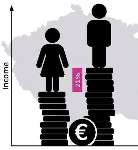Inequalities in Czechia
Published on Tue, 2020-02-25 10:05
The Czech Republic has enjoyed steady economic growth, low inflation and low unemployment in recent years. Income inequality (Gini coefficient 0.25) is the third lowest among OECD countries. In 2018 the proportion of citizens at risk of income poverty (relative poverty - with an income of 60% or less of the national median) were about 10% of the population, while those in absolute poverty (‘materially deprived’) were 8% of the population. Older citizens (65+ years) are worse off than other age groups. In 2018, 10% of households with children (30% of which were single- adult households - single mother or single father) found themselves in income poverty. Furthermore, Czechia has one of the highest proportions of homeless people in the European Union (0.65 % of the population). Debt enforcement and its impacts on poverty and deprivation is a particular manifestation of income inequality. It is further a consequence of bad political decisions made by previous governments. Overall, a combination of several factors, in particular the transfer of enforcement of court decisions to private bailiffs and the emergence of completely unregulated non-banking companies has resulted in almost 10% of the Czech population somehow affected by enforcement proceedings. If we include family members, around 2.5 million people – a quarter of the population are affected by these proceedings. In 2017, 863,000 citizens faced enforcement proceedings (a year-on-year increase of almost 3.5 %), with 493,000 people facing three or more enforcement proceedings. 6,000 children under 18 have been subject to enforcement proceedings as well as more than 120,000 older persons over 60 leaving receiving minimum income despite the fact that it is stipulated by law they cannot be subject to enforcement. Researchers have identified 606 socially excluded localities and 700 shelters in 297 cities and municipalities (small areas with a total population ranging from 95,000 and 115,000) with heavy concentrations of unemployment and indebted people. The majority of people living in the excluded localities are Roma, which proves the interlinkages of poverty, social exclusion and indebtedness to ethnic discrimination. By Ondřej Lánský, Social Watch; Stanislava Tomková, Czechia Against Poverty and Inequalities. Read this national chapter here. The full version of this report is available here. |


